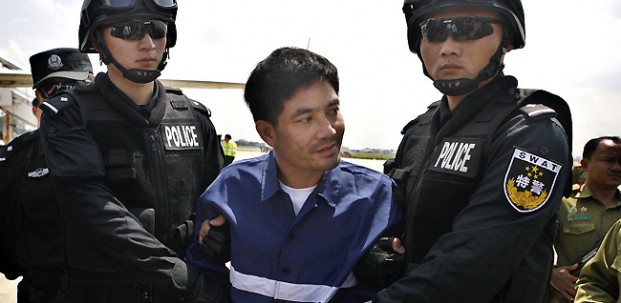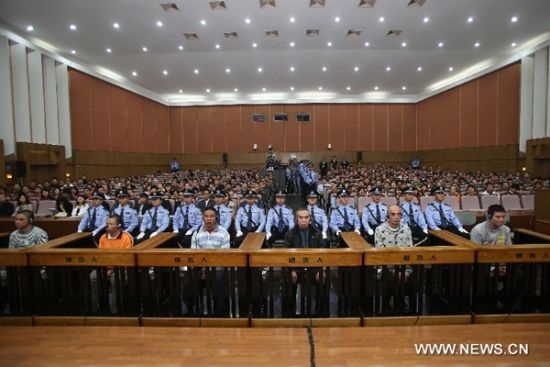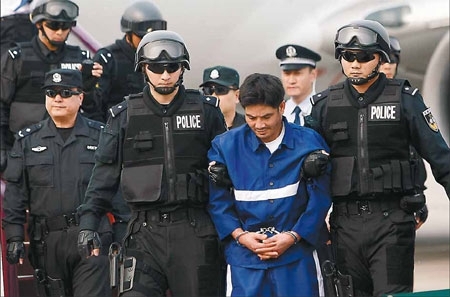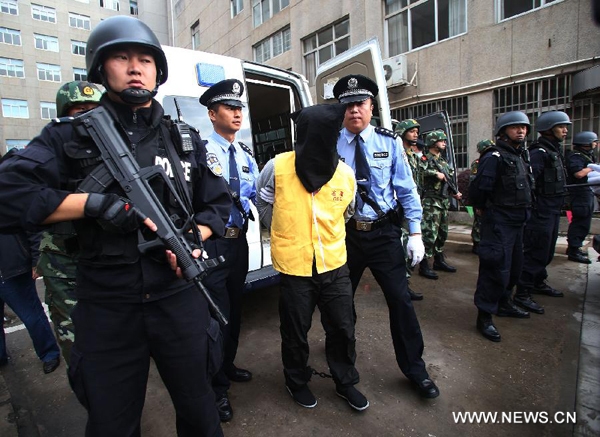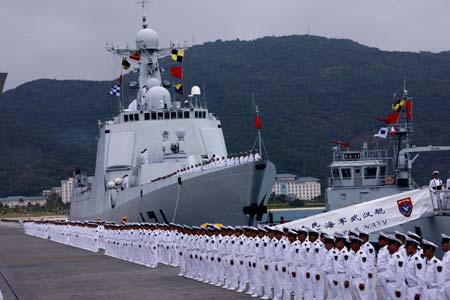February 21, 2013
by Roger L. Phillips

Naw Kham (first from right) and members of his gang hear the verdict of the first trial at the Kunming Intermediate People’s Court in Yunnan Province on November 6, 2012. Photo: CFP
There have been some interesting revelations in the case of Naw Kham, the so-called Mekong Pirate who presided over a transnational criminal network in the Golden Triangle of the Mekong river basin. (prior coverage here). Although Naw Kham was convicted of murder, drug trafficking, kidnapping and hijacking across international borders, this does not constitute piracy under UNCLOS as it did not occur on the high seas. Nonetheless, the case provides a fascinating case study in transnational organized crime and has important analogies to piracy on the high seas. Chinese media have focused on the operation to capture Naw Kham, whereas Western media have focused on the fact that China considered using an unmanned drone to kill him.
First the Chinese government-published Global Times provides details on how Naw Kham avoided capture by the Chinese in the Golden Triangle for so long.
During the search, Naw Kham vanished at least three times just as the Chinese police were closing in. [Taskforce leader] Liu said that this was largely because the Chinese police were limited in what they could do overseas. They had to launch appeals before undertaking operations and cooperate with local police.
But Naw Kham had lived in the Golden Triangle for many years and sometimes locals would aid him.
At the end of 2011, Chinese police located Naw Kham at a village by the Mekong River in Boqiao Province in Laos, the hometown of one of Naw Kham’s mistresses.
Chinese and local police encircled the village, but some local officials and villagers obstructed them. “We hit a stalemate. Police were not allowed to enter the village. Even though the local police head was with us, provincial officials were on the other side,” Liu said.
“The deadlock lasted hours, and it was getting dark. According to local customs, the search would have to be suspended after sunset.”
Liu finally found a senior military officer to help break the deadlock; however, police were only able to search six houses in the village and arrest the mistress and some gang members, seizing guns and cash. At night, Naw Kham crossed into Myanmar with the help of locals.
This highlights the fact that transnational criminality, and piracy in particular, will thrive where three conditions coexist: (1) lack of naval/police enforcement; (2) existence of water-borne commerce of significant value; and (3) poverty – motivating foot-soldiers to take extraordinary risks. In this case, the geography and multiple borders provided cross-jurisdictional cover for Naw Kham. Without strong international cooperation, he would not have been captured.

China’s unmanned Yi Long drone on display at the airshow in Zhuhai
In contrast, the New York Times have seized on the mention in the Global Times article that China had considered using an unarmed drone to kill Naw Kham.
Dennis M. Gormley, an expert on unmanned aircraft at the University of Pittsburgh, said of the reported Chinese deliberations, “Separating fact from fiction here is difficult.” But he added, “Given the gruesome nature of the 2011 killings [for which Naw Kham was convicted] and the Chinese public’s outcry for action, it’s not at all surprising to imagine China employing an armed drone over Myanmar’s territory.”
Mr. Gormley said the decision not to carry out a drone strike might reflect a lack of confidence in untested Chinese craft, control systems or drone pilots. “I think China’s still not ready for prime time using armed drones, but they surely will be with a few more years of determined practice,” he said. “And they surely will have America’s armed drone practice as a convenient cover for legitimating their own practice.”
Similarly, the United States had considered using unmanned drones against Somali pirates in the Indian Ocean, but that program suffered setbacks and U.S. drones were likely only used to surveil pirate-operations off the coast of Somalia. Ultimately, China decided not to use its new assets. Indeed, capturing Naw Kham with no reported casualties and without the need to launch a military strike in Thailand, Laos, or Myanmar was a much cleaner solution.


